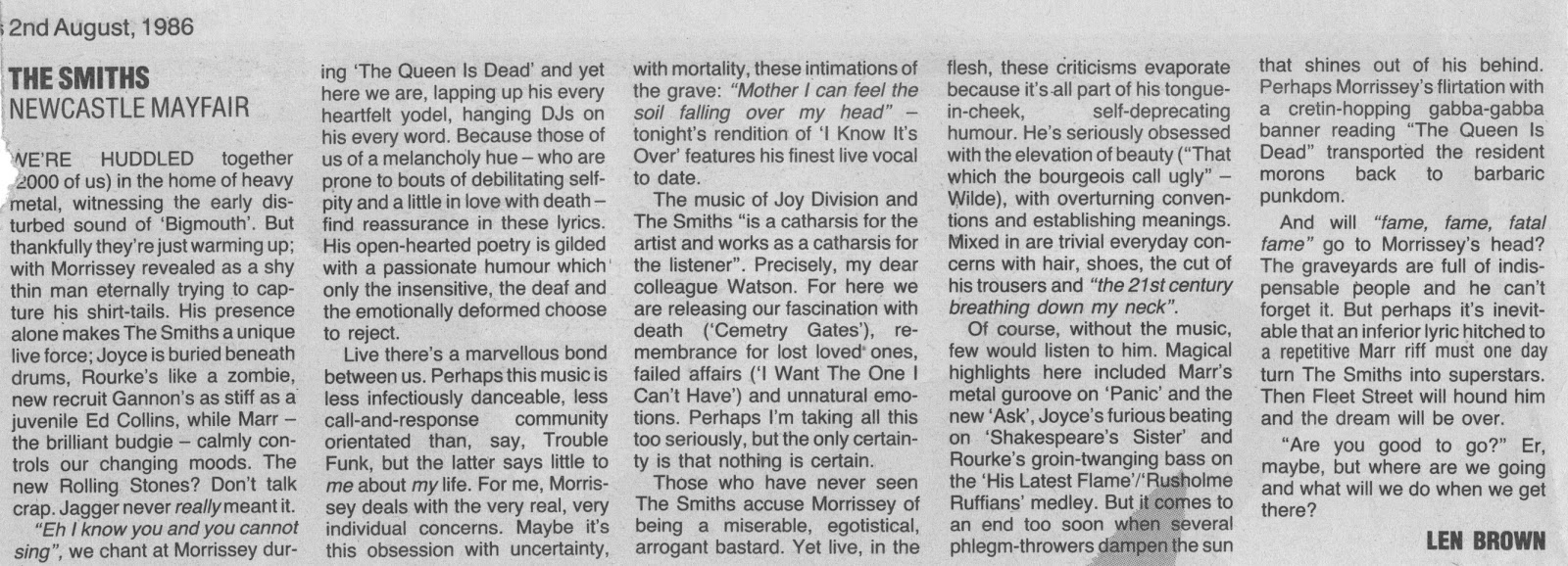1986 08 02 Smiths Newcastle Mayfair NME
2nd August, 1986
THE SMITHS
NEWCASTLE MAYFAIR
WE’RE HUDDLED together 2000 of us) in the home of heavy metal, witnessing the early disturbed sound of ‘Bigmouth’. But thankfully they’re just warming up; with Morrissey revealed as a shy thin man eternally trying to capture his shirt-tails. His presence alone makes The Smiths a unique live force; Joyce is buried beneath drums, Rourke's like a zombie, new recruit Gannon’s as stiff as ajuvenile Ed Collins, while Marr - the brilliant budgie - calmly controls our changing moods. The
new Rolling Stones? Don't talk crap. Jagger never really meant it.
“Eh I know you and you cannot sing”, we chant at Morrissey during ‘The Queen Is Dead’ and yet
here we are, lapping up his every heartfelt yodel, hanging DJs on his every word. Because those of
us of a melancholy hue - who are prone to bouts of debilitating self-pity and a little in love with death - find reassurance in these lyrics. His open-hearted poetry is gilded with a passionate humour which only the insensitive, the deaf and the emotionally deformed choose to reject.
Live there's a marvellous bond between us. Perhaps this music is less infectiously danceable, less
call-and-response community orientated than, say, Trouble Funk, but the latter says little to me about my life. For me, Morrissey deals with the very real, very individual concerns. Maybe it’s this obsession with uncertainty, with mortality, these intimations of the grave: “Mother I can feel the soil falling over my head” - tonight’s rendition of ‘I Know It's Over’ features his finest live vocal to date.
The music of Joy Division and The Smiths "is a catharsis for the artist and works as a catharsis for
the listener”. Precisely, my dear colleague Watson. For here we are releasing our fascination with
death (‘Cemetry Gates’), remembrance for lost loved ones, failed affairs (‘I Want The One I Can't Have’) and unnatural emotions. Perhaps I’m taking all this too seriously, but the only certainty is that nothing is certain.
Those who have never seen The Smiths accuse Morrissey of being a miserable, egotistical, arrogant bastard. Yet live, in the flesh, these criticisms evaporate because it’s all part of his tongue-in-cheek, self-deprecating humour. He’s seriously obsessed with the elevation of beauty (“That which the bourgeois call ugly” - Wilde), with overturning conventions and establishing meanings. Mixed in are trivial everyday concerns with hair, shoes, the cut of his trousers and “the 21st century breathing down my neck’’.
Of course, without the music, few would listen to him. Magical highlights here included Marr's metal guroove on ‘Panic’ and the new 'Ask', Joyce’s furious beating on ‘Shakespeare's Sister' and Rourke's groin-twanging bass on the 'His Latest Flame’/'Rusholme Ruffians’ medley. But it comes to an end too soon when several phlegm-throwers dampen the sun that shines out of his behind. Perhaps Morrissey’s flirtation with a cretin-hopping gabba-gabba banner reading “The Queen Is Dead” transported the resident morons back to barbaric punkdom.
And will “fame, fame, fatal fame" go to Morrissey’s head? The graveyards are full of indispensable people and he can’t forget it. But perhaps it’s inevitable that an inferior lyric hitched to a repetitive Marr riff must one day turn The Smiths into superstars. Then Fleet Street will hound him and the dream will be over.
“Are you good to go?” Er, maybe, but where are we going and what will we do when we get there?
LEN BROWN

Comments
Post a Comment